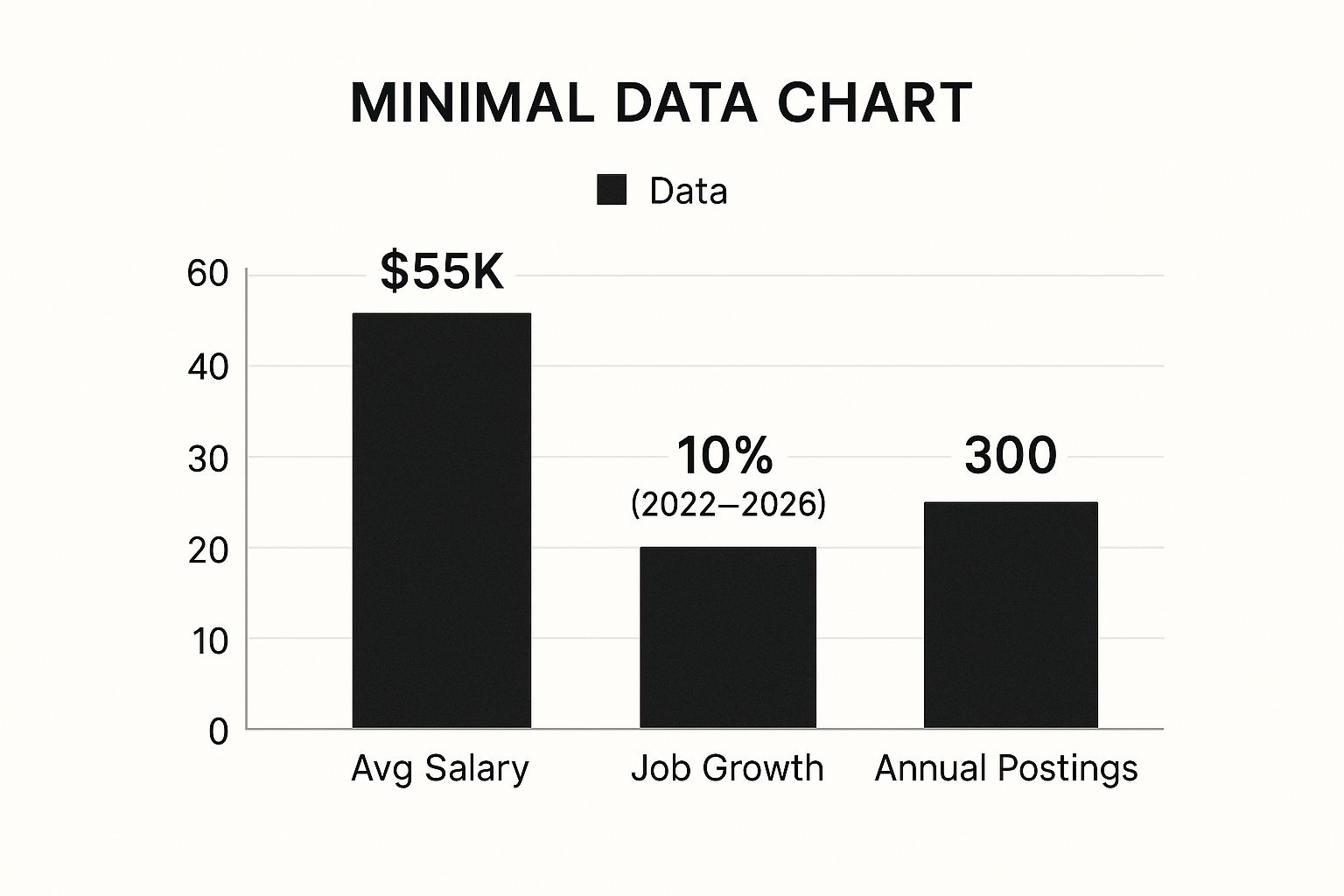
 18 minutes read
18 minutes read
So, you’re on the hunt for paralegal jobs in Charlotte, and you've probably figured out it’s not as simple as clicking "apply" a few dozen times. The Queen City's legal scene is absolutely booming. That means the competition is stiff, but for a skilled paralegal, the opportunities are genuinely top-tier.
Let's cut through the generic advice. This is your practical, boots-on-the-ground guide to landing a role you actually want in Charlotte.

Let's be real—you're here because firing off resumes into the digital void isn't getting you anywhere. Nailing down one of the great paralegal jobs in Charlotte takes more than just a polished LinkedIn profile. This isn't some sleepy town; it's a major financial hub, and the legal work here reflects that intensity.
While the city is anchored by corporate law giants in Uptown, don't make the mistake of overlooking the specialized boutique firms scattered from South End to Ballantyne. These smaller players are often more agile and can offer incredible hands-on experience you just won't get in a massive, siloed department.
Before you even start applying, you need to know the numbers. "Hope" isn't a strategy, and walking into a salary negotiation unprepared is a classic rookie mistake. The pay in Charlotte is solid, but it’s far from a one-size-fits-all number.
As of mid-2025, the average salary for a Charlotte paralegal hovers around $58,340 annually, which breaks down to roughly $28 an hour. But that's just the middle ground.
Here’s a quick breakdown of what you can expect to earn as a paralegal in the Charlotte market, based on current data.
| Percentile | Annual Salary | Hourly Wage (Approx.) |
|---|---|---|
| 10% (Entry-Level) | $45,890 | $22 |
| 25% | $51,690 | $25 |
| 50% (Median) | $58,340 | $28 |
| 75% | $68,360 | $33 |
| 90% (Top Earners) | $78,140 | $38 |
The most experienced, high-demand paralegals can easily push past $78,000, while entry-level roles often start closer to the mid-$40s. That’s a huge range, and it tells you one critical thing: your skills, specialization, and negotiation tactics matter. A lot.

We've seen it a thousand times: the paralegal with a specific certification or deep experience in a high-demand area like corporate litigation or real estate consistently lands at the top of that pay scale. Specialization isn't just a buzzword; it's your leverage.
Sure, the money is important, but what skills actually get you in the door? It’s about more than just knowing legal terminology. Charlotte firms are looking for paralegals who can think like business partners.
This really boils down to three key areas:
Getting the right credentials is often the very first step. Taking the time to understand North Carolina's https://hireparalegals.com/paralegal-certification-requirements/ is crucial to positioning yourself as a serious candidate. It's the baseline that gets your resume past the first scan and into a human’s hands.

Let's be blunt: your resume isn’t just a list of past jobs. It's your one-page marketing campaign. If all you're getting are polite rejection emails—or worse, crickets—your resume is probably whispering when it needs to be shouting.
In a competitive market like Charlotte, a generic resume that just lists your duties is a one-way ticket to the junk folder. Hiring partners are busy. They don’t have time to guess how your experience fits their needs. You have about ten seconds to make it crystal clear, or they’re on to the next one.
The biggest mistake I see, time and time again, is a resume filled with responsibilities instead of accomplishments. Nobody is impressed that you "managed case files." They want to know how you managed them, how many you handled, and what the outcome was.
Your goal is to shift every bullet point from a task you did to a problem you solved. Law firms operate on a simple principle: they lose money on inefficiency and make money on billable hours. Your resume has to show exactly how you protect their bottom line.
The best way to do this? Turn your duties into measurable achievements.
Night and day, right? One is a passive description. The other screams competence and results. That’s what gets you an interview. A great rule of thumb is to start every bullet point with a powerful action verb and, whenever possible, back it up with a number.

Your resume has one job: to survive the initial 10-second scan and beat the software filters. That's it. It’s not your life story; it’s the movie trailer that makes them want to see the feature film.
Before your resume ever lands in front of a human, it has to get past the gatekeeper: the Applicant Tracking System (ATS). These systems are programmed to scan for keywords, and if your resume doesn't have them, it gets filtered out automatically. When you're applying for paralegal jobs in Charlotte, North Carolina, you have to play the game.
Comb through a few relevant job postings from Charlotte-area firms. Are you seeing the same terms pop up repeatedly? Those are your keywords.
Weave these exact terms into your experience and skills sections. Don't just stuff them into a list. Build your achievement-based bullet points around them. This little bit of strategy is what separates the resumes that get seen from those that vanish into a digital black hole.
If your entire job search strategy is hitting 'Apply' on Indeed and hoping for the best, you’re missing about 90% of the game. Let’s be blunt: the most sought-after paralegal jobs in Charlotte are often filled before they ever see a public job board. It’s a classic “who you know” town.
So, where are these roles hiding? You need to stop thinking like a typical job seeker and start thinking like a Charlotte insider. It’s all about tapping into the local legal ecosystem, not just scrolling through endless listings.
The scattergun approach of mass-applying to every posting is a fantastic way to burn yourself out and collect a pile of rejection emails. Instead, you need to focus your energy where the signal is much stronger than the noise.
This means getting active in local professional groups. The Charlotte chapter of the North Carolina Paralegal Association (NCPA) isn't just a resume booster; it's a living, breathing network. Attorneys and hiring managers from top firms are members, and they frequently share openings there first to find vetted, serious candidates.

The reality is, a referral from a trusted colleague is worth more than a hundred random online applications. Firms would much rather hire someone who comes recommended than take a chance on a complete stranger. Your goal is to become a known quantity.
A quick look at current listings for paralegal jobs in Charlotte often shows over 110 active openings. These roles span specialties like litigation, real estate, and insurance defense, with hourly wages for entry-level positions typically falling between $25.65 and $32.06.
To find the right job, you have to know where to look. Charlotte’s legal market is heavily concentrated in a few key sectors. Applying for roles without understanding this landscape is like trying to navigate Uptown during rush hour without a map—you'll just go in circles.
Here’s a look at the most in-demand paralegal specialties in the Queen City.
| Specialty Area | Key Skills & Software | Typical Experience Level |
|---|---|---|
| Banking & Finance | Corporate law, compliance, SEC filings, document management (e.g., iManage, NetDocuments) | 2-5+ years |
| Real Estate | Title searches, closings, due diligence, contract review (e.g., SoftPro, Landtech) | 1-3+ years |
| Personal Injury & Litigation | Medical record summarization, discovery, e-filing (e.g., Clio, MyCase, CaseMap) | 1-5+ years |
| Corporate/Transactional | Entity formation, M&A support, contract management, corporate governance | 3-7+ years |
Understanding where you fit best helps you target your search far more effectively. Instead of applying for everything, you can focus on the firms and corporate legal departments that need your specific skill set.
This snapshot of the Charlotte paralegal job market shows a clear picture of salary expectations, projected growth, and the sheer volume of annual openings.

The data tells a clear story: this is a stable market with healthy growth. The right opportunities are definitely out there if you know how to find them. Don't just apply for jobs—target the industries that power this city.
If you want a deeper dive into the day-to-day realities of the role, check out our guide on how to https://hireparalegals.com/work-as-a-paralegal/.
Let's be real for a second. The word "networking" probably brings to mind stuffy conference rooms, flimsy name tags, and conversations that feel about as natural as a hostage negotiation. It’s often seen as a necessary evil, but it doesn’t have to be. In a city like Charlotte where relationships matter, your connections are your single biggest asset.
The goal isn't just to collect a stack of business cards to prove you showed up. It’s about building genuine rapport. When the perfect paralegal job opens up, you want your name to already be on the firm’s shortlist. Think of it as playing the long game, not just asking for a job on the spot.
Sending out a hundred generic connection requests is like shouting into the void. Most of them will disappear without a trace. Blindly messaging hiring managers with a simple "I'm looking for a job" comes across as desperate, and frankly, it just doesn't work.
You need a smarter approach. Instead of going straight for the hiring partners, try connecting with other paralegals at firms you admire. They're your peers, not gatekeepers, which makes them far more likely to respond to a genuine message.
Here’s a simple script I’ve seen get replies time and time again:

"Hi [Paralegal's Name], I came across your profile and was really impressed with your experience in [Specific Area, e.g., commercial real estate litigation] at [Firm Name]. I'm a paralegal focusing on [Your Specialty] here in Charlotte and am always looking to connect with other sharp professionals in the area. I'd love to hear your take on the industry here if you ever have a spare moment."
See the difference? You’re not asking for a favor. You’re starting a professional conversation. It’s a low-pressure way to reach out that respects their time and positions you as an equal, not just another job seeker.
Not all networking events are created equal. You could waste your Tuesday night at a generic "business mixer" and leave with a pocketful of cards from insurance salesmen, but that won't get you any closer to the best paralegal jobs in Charlotte, North Carolina. You have to be more strategic.
Focus on events where you’ll actually run into people from the legal field. Here’s where I'd start:
You’re not just talking about your skills; you’re proving them in a real-world setting. It’s a powerful two-for-one. You do some good in the community and build connections with people who can actually vouch for your work. They’ll remember the paralegal who helped them draft documents for a clinic, not the one who awkwardly handed them a business card over lukewarm coffee.

You got the interview. Let’s take a moment to celebrate that—you’ve already made it past the algorithms and the initial HR scan. Now for the part that really matters. The interview isn't just a Q&A session; it's your chance to show them you're the solution to a problem they have right now.
Too many paralegals walk into an interview and play defense, simply reacting to questions as they come. That’s a mistake. You need to shift the dynamic from the moment you shake hands. Think of yourself not as a job applicant, but as a consultant they’re bringing in to solve a need.
Showing up with only a surface-level knowledge of the firm is a non-starter. In a city like Charlotte, where the legal community is surprisingly interconnected, you’re expected to have done your research. This goes way beyond just glancing at their "About Us" page.
You need to dig deeper.
Walking in with this kind of intel immediately sets you apart from the pack. It shows you don't just want a job—you want this one.
I tell every paralegal I mentor to never, ever walk into an interview empty-handed. Bring what I call a "brag book." This is a professional binder filled with curated, redacted work samples that make your skills impossible to ignore. It’s one thing to claim you’re organized on your resume; it's another thing entirely to show them a perfectly assembled trial binder index or a complex table of authorities you created.
This isn’t your life’s work, just a highlight reel.

Your brag book is your proof. It turns abstract claims on your resume—like "strong legal writing skills"—into concrete evidence. When they ask about your experience with complex discovery, you can literally flip to a tab and show them. It’s a game-changer.
The job market here is robust. North Carolina is home to around 12,160 paralegals, with the Charlotte metro area accounting for 3,890 of them. The local average salary of $62,550 is higher than the state average, and projected job growth is nearly double the national rate. To get ahead in this competitive field, you need every advantage. You can find more data about the North Carolina paralegal market on Paralegal411.org.
At some point, they’ll ask, "So, do you have any questions for us?" Your answer should never be "No." This is your moment to interview them. The questions you ask reveal how you think and what you prioritize. Our guide on common legal assistant interview questions is a great starting point, but you need to go beyond the basics.
Ditch the generic questions about benefits for now. Instead, ask questions that show you're thinking about how you can make an impact.
Questions like these demonstrate that you’re not just looking for a paycheck. You're a strategic thinker looking to add real value, and that’s exactly how you close the deal.
Alright, let's cut to the chase. When you're deep in the trenches of a job hunt for paralegal roles in Charlotte, the same nagging questions always seem to pop up. Forget the vague, corporate-speak answers. Here’s the straight talk you actually need.
While North Carolina doesn't technically require certification to call yourself a paralegal, trying to land a good job in Charlotte without one is like showing up to a gunfight with a spork. It’s a terrible idea.
The market here is far too competitive to give firms an easy reason to toss your resume. An ABA-approved certificate is the universal signal that you’ve got the foundational training in legal procedures, ethics, and research. It tells hiring managers you won't need constant hand-holding from day one.
For career changers or recent grads, it's the fastest way to get your foot in the door. Without it, you’re starting at a huge disadvantage against a stack of candidates who checked that box. So no, it's not legally mandatory, but it’s practically essential.
This isn’t just about the size of the office building; it's a complete culture and workflow collision. Your day-to-day life will be radically different depending on which path you choose.
At a massive corporate firm in Uptown, you’re a specialist. You’ll likely get top-tier pay, amazing benefits, and work on high-stakes cases. The downside? Your role can be extremely siloed, the pace is relentless, and the environment is often more formal and structured.
Now, picture a smaller personal injury or family law practice in a neighborhood like Dilworth. You’ll be a jack-of-all-trades, a master of none, and the office chaos wrangler.

You'll have way more direct client contact, a wider variety of tasks, and a much clearer line of sight to how your work impacts a case's outcome. The pay might not reach the corporate heights, but the hands-on experience is invaluable. Decide if you crave structure or thrive in organized chaos.
It’s completely non-negotiable. Listing “Microsoft Office” on your resume in 2025 is like bragging that you know how to use a stapler. It’s the absolute bare minimum, and nobody is impressed.
Firms in Charlotte expect you to be fluent in modern legal tech from the moment you walk in. This includes:
If you see specific software mentioned in job descriptions, find free trials or watch tutorials on YouTube. Proving your tech skills is one of the easiest ways to elevate your application above the rest. It shows you’re ready to contribute, not just learn.
Ready to skip the endless job boards and connect directly with law firms actively seeking top-tier talent? HireParalegals offers a curated network of pre-vetted legal professionals, helping firms like yours find the perfect remote paralegal in as little as 24 hours. Discover how our on-demand talent platform can reduce your hiring costs by up to 80% and streamline your recruitment process today.